

2nd UNWTO Global Conference on Talent Development: Strategies for Competitive Destinations
Following the success of the UNWTO Forum on Talent Development in Tourism: Investing in Youth in Medellin, Colombia in 2015 and the first edition of the UNWTO Global Conference on Talent Development and Education in Tourism held in Bilbao in 2015, the World Tourism Organization (UNWTO) and Les Roches Global Hospitality Education, with support of the city government of Marbella, Malaga Regional Tourism Board, and Andalucia Regional Government, are organizing the 2nd UNWTO Global Conference on Talent Development in Tourism: Strategies for Competitive Destinations to be held from 8-10 October 2017 in Marbella, Spain.
This Conference will bring together policy makers and experts from public tourism administrations, private entities in addition to world renowned academics, to debate the decisive role of talent development and education in defining the competiveness of tourism destinations. The presentations will be complemented by a series of interactive working sessions giving all participants the opportunity to interact and share ideas. The conference also seeks to build awareness within the public and private sectors and among other tourism stakeholders about the importance of attracting and retaining young talent.
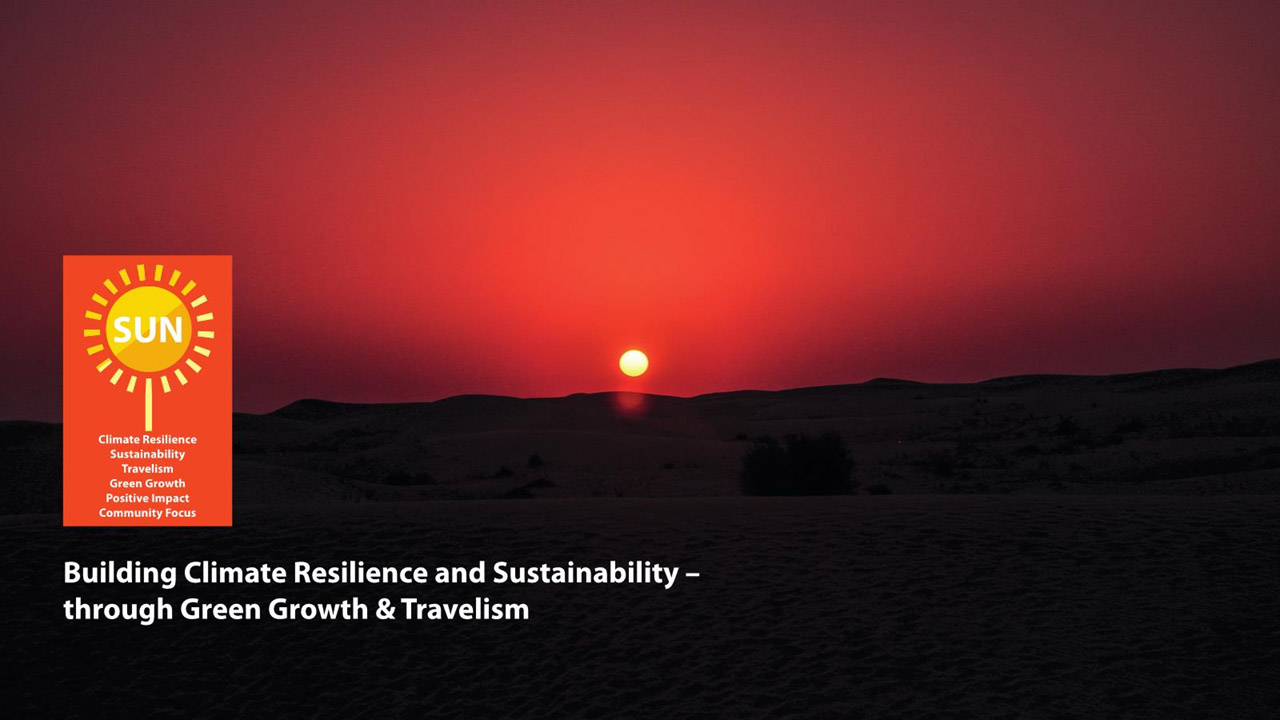
Manchester Wins First Climate smART Museum Award
29th September, 2017 London
The Climate smART Award is the first cultural initiative of SUNx – Strong Universal Network, which exists to actively encourage the massive Travel & Tourism sector to play a leading role in response to eXistential Climate Change. It is a legacy to our friend Maurice Strong, a champion of Sustainable Development and advocate for Travelism to radically revitalise its climate resilience actions, through Impact-Travel: measured; green; 2050 proofed.
Professor Geoffrey Lipman, SUNx Co-founder said:
“Climate Change is eXistential. SUNx strongly supports The Paris Accords which are under irresponsible threat. Travel and Tourism must stand up to this challenge, and public opinion can play a big part. This award will honour museums and cultural centres that make public education a priority and we are delighted to join up with Leading Culture Destinations Awards (LCD) – sharing their vision of Museums as focal points for education of travellers.”
Building partnerships is an essential part of climate resilience strategy. Our partnership with LCD is an important step. We believe that by creating a movement of organisations and individuals committed to climate education, innovation and resilience, we can catalyse change in the Travel & Tourism sector.
The judging panel of the Award is drawn from SUNx Council members with environmental, business, art, civil society and climate expertise. The process took into account the substance of the project, as well as outreach, quality, imagination and innovation. From a dozen longlisted nominees, we narrowed down to a shortlist of three leading-edge institutions, from different parts of the world, with the following result.
WINNER 2017 LCD/SUNx “Climate smART Award”
MANCHESTER MUSEUM: CLIMATE CONTROL Manchester, UK.
RUNNERS UP 2017 LCD/SUNx “Climate smART Award”
ART+CLIMATE=CHANGE 2017 Melbourne, Australia
FRANKLIN INSTITUTE: CHANGING EARTH Philadelphia, USA
Climate Control was developed as part of Manchester’s time as European City of Science. They wanted to connect people with climate change as it is a tremendous challenge, that goes far beyond the scientific, but into the social, economic, and social justice spheres.
Climate Control took place in two main areas: a specially designed exhibition in our special exhibitions space, that had as its starting point ‘we can’t change our past but we can change our future’.
The exhibition took inspiration from the Chinese Yin and Yang symbol. It had two entrances- ‘explore the past’ took the visitor into an all-black room which linked coal and fossil fuels with industrialisation and impacts on Arctic wildlife and worldwide. The other entrance took visitors into an all-white room, ‘explore the future’, where people shared their ideas and concerns around climate change, and solutions for a more sustainable future.
Climate Control has gone beyond a special exhibition, to represent the Museum’s commitment in this area of work. The Museum won its Carbon Literacy Organisation Award in 2016, being the first carbon literate museum in the world.
ART+CLIMATE=CHANGE 2017 Melbourne, Australia
A festival of exhibitions and events harnessing the creative power of the arts to inform, engage, and inspire action on climate change. ART+CLIMATE=CHANGE 2017 presents over thirty curated exhibitions at leading museums and galleries in Melbourne and regional Victoria including EXIT, the highly acclaimed 360° video installation commissioned by the Fondation Cartier pour l’art contemporain, Paris. EXIT investigates human migrations and their leading causes, including the impacts of climate change.
Its complete 2015 update coincided with the pivotal Paris based United Nations Climate Change Conference (COP21). Together with keynote presentations and public forums by leading international and Australian artists, scientists and activists, ART+CLIMATE=CHANGE 2017 will help us to acknowledge the challenges we are facing, and embrace the solutions that are already here.
FRANKLIN INSTITUTE: CHANGING EARTH Philadelphia, USA
Each experience in Changing Earth provides insights into repercussions that may result from our responses to changes—natural or manmade. Changing Earth is constructed of sustainable materials.
The flooring is made from recycled content and post-consumer waste products. All wood is Forest Stewardship Council certified or bamboo. All metal is recyclable. Paint is low-VOC and graphics are printed on recycled material using water-based inks.
Dynamic sensory experiences demonstrate the interconnected systems of earth science. Calculate your carbon footprint, find solutions to reduce carbon emissions, explore seismographs of recent earthquakes, and construct a building to see if it can withstand an earthquake. Experiment and discover how dams and water volume effect river flow and erosion. Go “on camera” and deliver your own weather forecast.
JUDGING PANEL
Tom Selänniemi – Director, Finnish Nature Centre Haltia (Chair) Finland
Geoffrey Lipman – SUNx Co-Founder, President ICTP. Former ASG. UNWTO CAN
Felix Dodds – SUNx Co-Founder- Former Exec Director UN Multi-stakeholder Forum, US
Ignace Schops – Director RLKM, Goldman Award, President Europarc Fed. Belgium
Tom Goldberg, MBE – Chair AWI, former M.D. Atlas Ward UK
Richard Prosser – Chair Audley Travel and Tusker Direct UK
Maureen Lipman, CBE – Actress, Columnist, Comedian UK
Paul Wilke – Former Global PR Manager Visa, CEO Upright Position Communications US
Rose Mukogo – Economist & former Director Research Zimbabwe Tourism Authority ZIM
Madan Bezberuah – Former Secretary Indian Ministry of Tourism IN
Jeanine Pires – Former Head of Embratour, Brazil Tourism BR
The Climate smART Award is part of a journey to raise awareness, develop education systems and to foster innovation. By 2030 we aim to have a SUNx Centre in every country and to inspire a cadre of committed neXt generation transformation advocates. These SUNx “Champions” will help to drive the behavioural change and influence the fundamental government and industry actions needed.

The dance of diplomacy
by Anita Mendiratta
September. A month in which the world shifts its focus onto the United Nations.
The 72nd Session of the UN General Assembly has commenced in New York. The period of the 12th through to the 25th September brings together literally thousands of diplomats, direct reports, decision makers, donors, delegates and media determined to stay ahead of the issues that form the agenda around which 193 member states unite.
Across the city national flags from across the world splash out their colors, while sirens and blue lights signal VIPs in transit. Mobility is challenged both on the main roads and in the meeting rooms. Getting from A to B whether a place, a policy or a principle, can and does demand careful maneuvering.
It’s all about diplomacy.
To see diplomacy in action is to watch a slow, subtle dance unfold. The steps are ever so carefully choreographed – the movement of a hand, blink of an eye, shift of a shoulder…each a form of communication. Together, apart, together, together, together, apart. Nothing ever stays the same. The tempo of the music, the style of the steps – each and every motion becomes an expression of interests, intentions, intrigue.
For many in the audience, the dance can become frustrating to watch.
Who is leading? Is the follower happy to do so, or actually wanting to be change the song, seeking to lead? Why such hesitation?
Being ever so careful not to step on toes, the dance works its way through. Externally, it appears a graceful management of energy and emotion. Below the surface, however, diplomacy can in fact be an invisible, full body sport.
Such was the case recently when another UN General Assembly took place, this time in the global Travel & Tourism space. The stage: Chengdu, China. The occasion: the 22nd General Assembly of the UNWTO – the United Nations World Tourism Organization.
Over 1300 global tourism leaders came together to shape a shared future of one of the world’s most important sectors – a sector that is today responsible for 1 in 10 jobs worldwide, 10.2% GDP, 30% Services Exports. The stats are one side of the powerful story. The other: the ability of Travel & Tourism to act as a priceless vehicle for preserving cultures and identities of peoples across the globe, protecting natural environments and communities, and promoting peace through the alchemy of understanding and respect that travelling unlocks.
Over the course of the UNWTO GA week, statutory meetings put the plan of work of the organization front and center. Initially meeting by region, the global collective then came together to tackle critical issues of the day. Of highest priority: confirmation of the Secretary General-elect, the individual who would define the course and culture of the organization for at least the next four years, commencing January 1, 2018. But this was no usual nominee confirmation process. These were no simple, easily resized shoes to fill.
Who would, who could, possibly succeed one of the finest, wisest and sharpest Secretary Generals that the organization, perhaps even the UN system, has ever had at the helm? Organizational meaning, momentum and unity were all on the line. Who would be able to smoothly, confidently cut in on, and take over, this critical dance with the same style and substance?
When the time came to confirm the leader charged with the responsibility of leading the organization, the diplomatic dance took a dramatic twist. The music could not have been more deafening, more penetrating. Intense debate, with unprecedented moves, at times left the dance floor boards close to cracking. The floor that connected one and all started to splinter away. Fatigue, frustration and fury – powerful, deep bass notes muting any trebles trying desperately to break through.
And yet somehow, somehow, a collective rhythm was found. The mental gymnastics spontaneously, diplomatically performed by the outgoing Secretary General to shift individual styles into a line dance of 1300 were exhausting to even watch. With fierce strength of spirit determined not to let the floor fall through, finally, masterfully, a piece of music, a proposed way to move forward, was found. Its chords penetrated people’s hearts, shifting their steps from ‘I’ to ‘we’. It was a United Nations show of truly united nations.
So rightly, so deservedly, as the music stopped, a wave of standing ovation began. Instantly, the thick, heavy heat that had built up in the room was pushed out as fresh, pure air washed through. The music hushed…the tears fell.
Crossing the globe, the steps that will carefully, cautiously, thoughtfully unfold in New York this week will, no doubt, prove to be history-making. Thankfully we have within the global community a few, just a few, masterful dancers of diplomacy who not only understand the steps that need to be choreographed to reach a truly inspired, uniting outcome, they seek to teach them.
Dr. Rifai, please take a bow.
© Anita Mendiratta
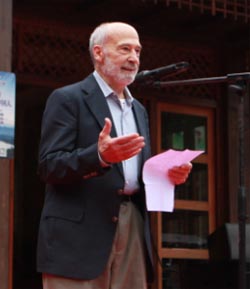
IIPT and China Chamber of Commerce Peace Park project after UNWTO General Assembly
| Peace Through Tourism is now including China. After the recently concluded UNWTO General Assembly in Chengdu, the International Institute for Peace Through Tourism launched the IIPT Global Peace Parks Project with the dedication of Pu’er Sun River National Park as an IIPT International Peace Park in collaboration with the China Chamber of Tourism.
China Chamber of Tourism Chairman, Peter Wong stated: “Pu’er Sun River National Park is the perfect site for the first IIPT International Peace Park in China as it is a national model of the “wild beauty of nature” covering an area of 216 square kilometers with a wide variety of plants and 812 species of wildlife. In is also a model of people in harmony with nature showcasing the local culture of the diverse ethnic people of the region.”
In his Peace Park dedication address, IIPT Founder and President Louis D’Amore said: “It is truly an honor to be here with you today as we dedicate this IIPT International Peace Park – the first in China, just a few days before the UN International Day of Peace, September 21 – and in support of UN Sustainable Development Goal 16 which calls for peaceful – inclusive and just societies. As we dedicate this park, we also begin what I am sure will be an important and fruitful relationship between the China Chamber of Tourism and the International Institute for Peace through Tourism; a relationship that will bring more peace parks in China and contribute towards the vision of tourism becoming the world’s first global peace industry – and the belief that every traveler is potentially an ambassador for peace.”
The Pu’er Sun River National Park focuses on the theme “wild beauty of nature” in combination with the local culture and the harmony of humans with nature. By operating profit-making projects within the Park, it is able to effectively provide sustainable protection for precious and unique natural and cultural resources. The Pu’er Sun River National Park also serves as a Forest Ecological System Science Education Base; Flora and Fauna Rescue Base; and Global Tourist Attraction for visitors to experience nature and the Pu’er Culture.
Members of China Chamber of Tourism following the unveiling of the stone plaque The IIPT Global Peace Parks project has a goal of 2,000 Peace Parks circling the earth by 11 November 2018 – the 100th Anniversary of the end of World War I. The four year commemoration of the World War I Centenary, with its theme of “No More War” – has been supported by IIPT since its launch in 2014. IIPT is proud to have United Cities and Local Governments (UCLG) as a partner in its global campaign. UCLG is the united voice and world advocate of democratic local self-government with a global network of cities, local and regional governments representing 70% of the world population. UCLG goals include contributing to the achievement of the SDG’s, Paris Agreement, Sendai Framework for Disaster Risk Reduction, and New Urban Agenda for Sustainable Urban Development. The Global Peace Parks Project builds on the success of IIPT’s 1992 “Peace Parks across Canada” Project commemorating Canada’s 125th birthday as a nation. IIPT conceived and implemented “Peace Parks across Canada” which resulted in 350 Peace Parks being dedicated by cities and towns from St. John’s, Newfoundland on the shores of the Atlantic, across five time zones to Victoria, British Colombia on the shores of the Pacific. The Peace Parks were all dedicated on October 8, 1992 as a National Peace Keeping Monument was being unveiled in Ottawa and 5,000 Peacekeepers passing in review. Each park was dedicated with a ‘bosco sacro’ – a peace grove of 12 trees, symbolic of Canada’s 10 Provinces and 2 Territories, as a link to one another, and a symbol of hope for the future. Of the more than 25,000 Canada 125 Projects, Peace Parks across Canada was said to be the most significant. IIPT International Peace Parks have since been dedicated as a legacy of each IIPT International Conferences and Global Summits. Notable IIPT International Peace Parks include Bethany Beyond the Jordan, site of Christ’s baptism as a legacy of the Amman Summit, 2000; Victoria Falls, as a legacy of the IIPT 5th African Conference, 2011, subsequently re-dedicated as the featured event on Opening Day of the UNWTO 20th General Assembly 2013, co-hosted by Zambia and Zimbabwe; and Medellin, Colombia, dedicated on Opening Day of the UNWTO 21st General Assembly. Photo is Dr. Kenneth Kaunda, first President of Zambia and UNWTO Secretary General, Dr. Taleb Rifai, planting the first of six olive trees during the re-dedication of the IIPT International Peace Park, Opening Day of the UNWTO 20th General Assembly. About China Chamber of Tourism The China Chamber of Tourism was formed in 2002 to include all sectors of the travel and tourism industry and related industries throughout China. It is based on a concept of “Pan Tourism” with the belief that tourism as a bond could connect and lead industries to develop co-operatively. Its core beliefs are “tourism is peace” and that world tourism calls for world peace; tourism is culture and the improvement of life quality. China Chamber of Tourism has achieved fruitful co-operation with UNWTO, WTTC, PATA – and now IIPT – enhancing the co-operation and exchange of Chinese and tourism enterprises of other nations. |
||
| About IIPT The International Institute for Peace through Tourism (IIPT) is a not for profit organization dedicated to fostering travel and tourism initiatives that contribute to international understanding, cooperation among nations, an improved quality of environment, cultural enhancement and the preservation of heritage, poverty reduction, reconciliation and healing wounds of conflicts; and through these initiatives, helping to bring about a peaceful and sustainable world. It is founded on a vision of the world’s largest industry, travel and tourism – becoming the world’s first global peace industry; and the belief that every traveler is potentially an “Ambassador for Peace.” |
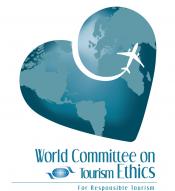
The mandate of the World Committee on Tourism Ethics renewed until 2021
With a leading role in the recent approval of the Framework Convention on Tourism Ethics by the UNWTO General Assembly held in Chengdu, China, the composition of the World Committee on Tourism Ethics has been renewed.
In order to continue advancing the important work of this subsidiary organ of the UNWTO General Assembly, the mandate of the outgoing members of the World Committee on Tourism Ethics was renewed until 2021, with Pascal Lamy continuing to chair the Committee.
Joining the four Members whose mandate was set to end in 2019 – Yoshiaki Hompo (Japan), Fiona Jeffery (UK), Tanja Mihalic (Slovenia) and Eugenio Yunis (Chile) – will be Gede Ardika (Indonesia), Jean Marc Mignon (International Social Tourism Organization) and Ron Oswald (The International Union of Food, Agricultural, Hotel, Restaurant, Catering, Tobacco and Allied Workers’ Associations) as Committee Members, and Hiran Cooray (Sri Lanka), Suzy Hatough (Jordan) and Günnur Diker (Turkey) as Alternates.
The only new member joining the World Committee on Tourism Ethics four a four-year term starting 17 September 2017 is Rosette Chantal Rugamba, Founder and Managing Director of Songa Africa and Amakoro Lodge (Rwanda).

Seychelles Tourism Minister’s message on the occasion of World Tourism Day 2017
Today Wednesday September 27 is World Tourism Day and Seychelles joins the rest of the world to commemorate this day, which aims to raise awareness among the international community of the importance of tourism and its social, cultural, political and economic value.
Sustainable Tourism – A Tool for Development is the theme chosen by the UNWTO this year.
To mark the occasion the Minister for Tourism, Civil Aviation, Ports and Marine has sent the below message:
We must all ensure and take ownership of sustainable tourism
As Tourism Day comes around once again, it gives us the opportunity to reflect on this industry that has become not only the economic mainstay of our nation but also the backbone of the global economy.
It is in this global context that we must continue to celebrate our tourism, echoing the 2017 UNWTO theme which is “Sustainable Tourism – a Tool for Development” because if sustainable tourism is going to part of our culture, then it must become so, not just locally, but internationally.
Sustainable tourism is a term that is much bandied about these days and what, in essence it implies is that we must conduct ourselves and our businesses in such a way that will allow us to continue to do in the future what we do today…only in an ever better and more efficient, eco-friendly way.
To do otherwise, will be to saw through the branch upon which we are seated and deplete our tourism capital so that eventually nobody will wish to come and visit our islands. You may believe that is an exaggeration but let me hasten to assure you that this is a disaster waiting in the wings that has already happened to certain regions of the world.
Sustainable tourism is indeed a tool for development because it recognizes, protects and nurtures the Unique Selling Propositions (USPs) of our country, which are those attributes that most attract visitors to our shores: our pristine, clean environment; our social and political harmony, and our culture which is what the modern traveller increasingly hopes to discover when on holiday.
These are chief among Seychelles’ blessings and behaving sustainably will allow them to continue to be the foundation of the extraordinary Seychelles experience. Sustainable tourism is not only the responsibility of governments…it is the responsibility of each and every one of us to ensure and to take ownership of. To succeed, it must become our way of life and when we celebrate World Tourism Day together, across the planet, we do so in recognition of the fact that we must all do this together!
Here, at home, 2017 is shaping up into another year where tourism records will again be broken. Last year, we smashed the 300,000 visitor ceiling and God willing, this year will see a substantial increase in our visitor numbers which, even now, are on the rise.
And yet, while we rejoice in our good fortune, it is important to keep a sense of perspective because these figures do not arrive by magic or because we are entitled to them.
A great deal of hard work on the part of all the tourism players and stakeholders in the country: STB; the national airline, Air Seychelles; all airlines serving the Seychelles; the DMCs: hotels; boat carters; car hires and the general public all contribute towards making Seychelles attractive to tourists. The day we fail to appreciate this and allow philosophy of ‘business as usual’ to set in, is the day we will fail to attract those numbers.
Much goes on behind the scenes to ensure the continued progress of our tourism and when we see, for example, the return of British Airways to our shores after so many years, you can be sure that it is the result of much hard work on the part of the authorities concerned. And when we see British Airways and other companies investing in doing business with Seychelles, then it is because they believe in us and have confidence in our brand and our product.
The core of my message to you on this tourism day is that we are all in this together. Tourism is our national industry and our individual attitudes towards our industry will influence its success or failure, whichever we choose.
We live at a time of great and intensifying international tension which is already impacting on peoples’ holiday choices. Keeping Seychelles safe, clean and welcoming in nature must become a personal campaign for each and every one of us as we educate our children to do the same.
Happy World Tourism Day.
Ambassador Maurice Loustau-Lalanne
Minister for Tourism, Civil Aviation, Ports and Marine

A message on World Tourism Day from Grenada’s minister of tourism and civil aviation Dr. Clarice Modeste Curwen
Grenada’s Minister for Tourism, Civil Aviation and Culture Hon. Clarice Modeste Curwen issued the following message on the occasion of World Tourism Day:
It gives me great pleasure to celebrate this special observance of World Tourism Day under the theme, “Sustainable Tourism, a tool for development.” Internationally and locally, the tourism industry contributes millions to the economy, creates livelihoods and facilitates a rich cultural exchange. In Grenada, the Tourism Industry provides direct and indirect employment for approx. 11,000 people and in 2015 visitors spent 392 million EC dollars in the economy.
The benefits are tremendous; however, we find ourselves at a crossroads. How do we maximize the benefits from this industry to promote sustainable development and a brighter future for generations to come? How do we as Governments, industry contributors and citizens play our part in making our countries and the world a better place. This means sustainable economic growth, decent jobs, preserving the environment and addressing climate change, celebrating and preserving diversity and culture and promoting peace.
Pure Grenada, Carriacou and Petite Martinique is well on its way to making its contribution in creating a better world by preserving our natural environment. Already, many of our hotels have implemented energy saving measures to their businesses while some have stopped using Styrofoam products. The Government of Grenada has also pledged to table legislation banning the importation of Styrofoam and plastic as part of a proper waste management strategy. The effects of Styrofoam are well known as it is non-biodegradable and its link to cancer has been explored. This ban on Styrofoam and plastic will be a priority going forward.
Our brand Pure Grenada, Spice of the Caribbean reminds us that we should all aspire to do our part to ensure that our island gems remain clean and beautiful. I encourage you to support this brand by incorporating sustainable practices in your lives to achieve this goal whether it’s by conducting a community cleanup, encouraging friends and family to properly dispose of waste or implementing energy saving measures in your homes. Take the pledge today to keep Grenada, Carriacou and Petite Martinique Pure.
As we observe World Tourism Day, Secretary General of the World Tourism Organization Taleb Rifai reminds us that whenever you travel, wherever you travel, remember to: Respect Nature, Respect Culture and Respect your host. Together, our efforts can be the catalyst for meaningful and sustained change through Tourism.
Happy World Tourism Day!

World Travel & Tourism Council looks at how tourism Transforms our World to celebrate World Tourism Day
The World Travel & Tourism Council (WTTC) joins UNWTO in the celebration of World Tourism Day in Qatar to highlight the economic, social and environmental contribution of Travel & Tourism to sustainable development around the world.
Gloria Guevara, President & CEO, WTTC, said: “Travel & Tourism is a remarkable sector, it brings people from different backgrounds, culture and beliefs closer together, driving peace, in addition to the significant socioeconomic benefits to a country’s welfare and local livelihoods.
Travel & Tourism has a huge role to play in sustainable development, whilst on average global level the sector generates over 10% of the world’s GDP and supports 1 in 10 jobs, these figures can be, and often are, a lot higher and denser on local level. When done well, which means growing Travel & Tourism in a sustainable and inclusive fashion, tourism is a catalyst for job creation, community development, environmental protection and economic growth.”
The strength and beauty of how Travel & Tourism can impact and change people’s lives in a positive way are encompassed in the stories in WTTC’s new campaign ‘Transforming our World’.
Transforming our World provides an insight into the stories of people that operate in Travel & Tourism and show how the sector has transformed their world or how they use tourism to transform other people’s worlds.
Guevara added: “I believe there is a real value in storytelling and as a sector this is something we can do better. Sharing a story is powerful, inspirational, and educational. Through our campaign I encourage other people and organisations within Travel & Tourism to share their story too.”
The current campaign stories, which come from WTTC’s Tourism for Tomorrow programme, cover the transformational stories of people in all corners of the world – including Botswana, China, India, Indonesia, Ireland, Kenya, Mexico, and USA – and cut across education, community, nature, and wildlife.
WTTC would love to hear how tourism has transformed your life, please share your story on: http://www.transformingour.world/awards/whats-your-story/
#transformingourworld
Visit the Transforming our World website here.
For more information on Tourism for Tomorrow, click here.
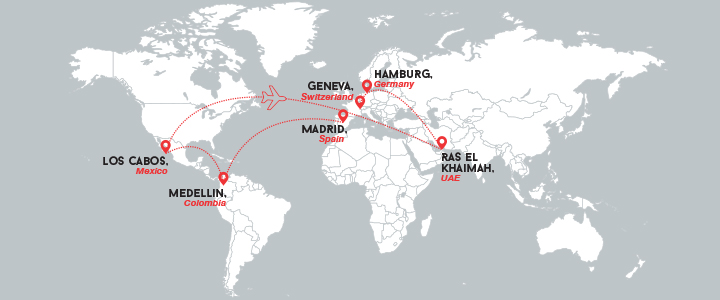
UNWTO launches a travellers’ competition to promote sustainability
With the aim of promoting responsible travel, the World Tourism Organization (UNWTO) has launched a travellers’ competition ahead of World Tourism Day. The initiative is part of the ‘Travel.Enjoy.Respect’ campaign taking place within the International Year of Sustainable Tourism for Development 2017. A one-month trip across the world visiting sustainable tourism initiatives is the prize that will be awarded to the winner of the competition.
“Every action counts and travellers have a strong role to play in building a more sustainable tourism sector. Imagine the impact of one small action multiplied by millions”, said Taleb Rifai, Secretary-General of UNWTO. “We want to inspire all travellers to be the change they want to see in the world.”
Competition entrants are invited to share their travel experiences at www.travelenjoyrespect.org and explain why they should be selected to represent the global “responsible traveller”.
This journey will start at the UNWTO Headquarters in Madrid, with an official ‘designation’ ceremony with the Secretary-General, and will end at the closing ceremony of the International Year of Sustainable Tourism for Development 2017 in Geneva, Switzerland, where stakeholders from the tourism community and the UN family will unite.
The winner’s across the world journey will be supported by Explore WorldWide, an adventure travel group offering a wide range of activities and experiences with a commitment to responsible travel and a pinch of Explore spirit. Destinations including Colombia, Germany, Mexico, the United Arab Emirate of Ras al-Khaimah and the Léman region in Switzerland have offered to host the winner and help them discover responsible and sustainable tourism practices.
The competition is one of the main activities of the ‘Travel.Enjoy.Respect’ campaign that UNWTO launched to raise awareness of the value and contribution that sustainable tourism can make towards development, and to engage tourists in making the sector a catalyst for positive change.

Zanzibar grapples to protect children from abuse
The United Nations Children Fund is working with the Zanzibar government to eliminate child abuse in the rich tourist island in the Indian Ocean coast.
Rich in beach tourism, Zanzibar has been rated among African destinations haunted by “sexcapades” from Europe, Africa and South East Asia.The Island had in recent years reported an increase on children abuse in different forms, from family to institutional levels.
Tourist hotels are mentioned among institutions known for gearing sexual and child abuse in the island.
Zanzibar government is now looking for financial and technical support from United Nations agencies and other donors to help the island fight gender-based and child abuse violence rampant in the island.
Zanzibar Minister for Labour, Women and Children Maudline Castico recently launched a five- year National Action Plan looking to end rampant abuse to children and women in the island.
Through support from UN agencies, the Zanzibar government is looking to implement a five-year plan aimed to protect children the island and said his semi-autonomous government will ensure that women and children are highly protected from gender and child violence. The program will cost about a US$ 20 million.
The UN agencies had raised a concern over rampant child abuse where child abuse affects two out of three children born in the island. The UN report says that 6 out 10 boys and 7 out of 10 girls had experienced violence through different forms in the island.
UN says that child abuse in Zanzibar has been connected with abuse and violence against women where one (1) out of nine (9) women have been sexually abused.
Zanzibar President Dr. Ali Mohammed Shein said through a statement that his government will work out to end violence against children and women by imposing laws and legislations leading to tough punishment against violence perpetrators.
“Violence is a daily reality for significant numbers of women and children in Zanzibar. The immediate and long term social, health and economic consequences of violence against women and children represent a key challenge to national development”, Dr. Shein said in the statement.
United Nations Children Fund (Unicef) Representative in Tanzania Ms. Manisa Zaman said culture of silence in Zanzibar has been a cause for child abuse where parents kept silent when their children fall victims to torture and physical assaults.
The United Nations World Tourism Organization (UNWTO) had underlined Global Code of Ethics for Tourism, aimed to end exploitation of human beings in any form, especially when applied to children.
“We cannot build the responsible and sustainable tourism sector that we seek without protecting the most vulnerable in our societies. To do so we need effective tools and a global commitment,” said UNWTO Secretary-General, Dr Taleb Rifai in July during a meeting which discussed tourism ethics.
“Sexual exploitation in travel and tourism has a child’s face. No country is untouched by this phenomenon and no child is immune,” Dr. Rifai said.
“We cannot build the responsible and sustainable tourism sector that we seek without protecting the most vulnerable in our societies. To do so we need effective tools and a global commitment,” he noted.
The fight against Child Exploitation in tourism is one of the priorities of UNWTO who has been leading since 20 years the World Tourism Network on Child Protection.
UNWTO said that the rise of the Internet and informal operators as well as greater access to international travel have expanded ‘demand’ and heightened the dangers for children. At the same time, grinding poverty and lack of education combined with the continued neglect of child protection systems, all have fuelled children abuse.
In the context of the universal 2030 Agenda for Sustainable Development and the Sustainable Development Goals (SDGs), the International Year aims to support a change in policies, business practices and consumer behaviour towards a more sustainable tourism sector that can contribute to all the 17 SDGs.
Zanzibar is a popular sex tourism destination for European tourists, attracting girls from poor families to engage themselves in sex business. The semi-autonomous island has been dominated by sex workers operating under top secrecy.
The island depends tourism as its main economic artery, banking on its pristine beaches.
In his message to mark the 2017 World Tourism Day, Dr. Rifai said, “Whenever you travel, wherever you travel, remember to respect nature, respect culture and respect your host”.
BY APOLINARI TAIRO, ETN TANZANIA CORRESPONDENT

 Dignitaries participating in the ceremony included Madame Wang Ping, Founding Chairman, China Chamber of Tourism (Photo on the left); Mr. Peter Wong Man Kong, Executive Chairman, China Chamber of Tourism; Mr. Yu Jinfang,Co-founder and Developer of Pu’er Sun River National Park; Mrs. May Jinfang, Co-founder and Developer;
Dignitaries participating in the ceremony included Madame Wang Ping, Founding Chairman, China Chamber of Tourism (Photo on the left); Mr. Peter Wong Man Kong, Executive Chairman, China Chamber of Tourism; Mr. Yu Jinfang,Co-founder and Developer of Pu’er Sun River National Park; Mrs. May Jinfang, Co-founder and Developer;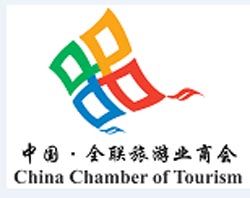 Mr. Carlos Vogeler, Executive Director, UN World Tourism Organization; Mr. Xu Jing, Regional Director for Asia and Pacific, UN World Tourism Organization; Hon. Gede Ardika, former Minister, Culture and Tourism, Indonesia; Helen Marano, Government and Industry Affairs Director, World Travel and Tourism Council (WTTC); Louis D’Amore, IIPT Founder and President and various city officials of Pu’er City.
Mr. Carlos Vogeler, Executive Director, UN World Tourism Organization; Mr. Xu Jing, Regional Director for Asia and Pacific, UN World Tourism Organization; Hon. Gede Ardika, former Minister, Culture and Tourism, Indonesia; Helen Marano, Government and Industry Affairs Director, World Travel and Tourism Council (WTTC); Louis D’Amore, IIPT Founder and President and various city officials of Pu’er City.
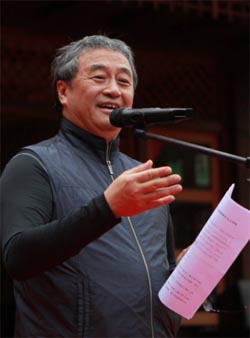 From top to bottom: Start of the Peace Park Dedication; China Chamber of Tourism Chairman Peter Wong giving his address followed by Louis D’Amore address (feature photo)
From top to bottom: Start of the Peace Park Dedication; China Chamber of Tourism Chairman Peter Wong giving his address followed by Louis D’Amore address (feature photo)

